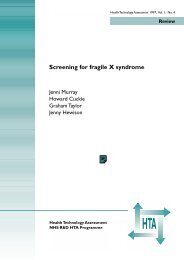The NIHR Carbon Reduction Guidelines
The NIHR Carbon Reduction Guidelines
The NIHR Carbon Reduction Guidelines
Create successful ePaper yourself
Turn your PDF publications into a flip-book with our unique Google optimized e-Paper software.
<strong>NIHR</strong> <strong>Carbon</strong> <strong>Guidelines</strong>:Key recommendations for researchersSetting the research question and making full use of existing evidence1 Involve patients and clinicians in shaping applied research agendas and specific questions2 Carry out systematic reviews of existing evidence before submission of new grant proposalsEfficient study design3 Make good use of resources such as patient populations and patient time4 Consider whether it is possible to answer several questions through one study(factorial design)5 Involve methodologists in the design of researchStudy set up and conduct6 Where appropriate, engage with the <strong>NIHR</strong> networks, other researchers and researchmanagers to facilitate study set up and progression7 Work with the appropriate <strong>NIHR</strong> Topic Specific or Comprehensive Local Research Networkif this can facilitate setup and recruitment of research participants. In addition, work withthose directly involved in recruitment (e.g. patients, clinicians and network staff) to optimiseprocedures for recruitment and retentionAvoiding unnecessary data collection8 Study protocols should clearly set out what will be measured, when it will be measured, andhow the measures will be used in the analysis, as illustrated in shell/dummy tabulations9 Outcomes should be measured remotely by phone, mail, or the internet whenever possible10 When patient contact is necessary, outcome assessors and patients should begeographically close together where possible11 Depending on the study, not all outcomes need to be measured in all patients at all timesSensible clinical trial monitoring12 Focus on issues that are critical for the safety and wellbeing of study participants and thereliability of the results13 Avoid inefficient or ineffective monitoring practices, particularly those that require extensivetravel to sites14 Use centralised, systematic methods to assess quality and identify issues15 Site visits should be targeted to sites where there are concerns or a need foradditional trainingGood practice in reporting research16 Set the results of new primary research in the context of updated systematic reviews ofother relevant research17 Ensure that reports of research contain the information needed to make them usableto readersReducing the environmental impact of the NHS through research18 Ensure that the results of research are rapidly and appropriately disseminated19 Where appropriate, consider assessing the environmental impact of proposed interventionsor changes in service provision within research studiesTable 1: Summary of the recommendations for researchers6

















